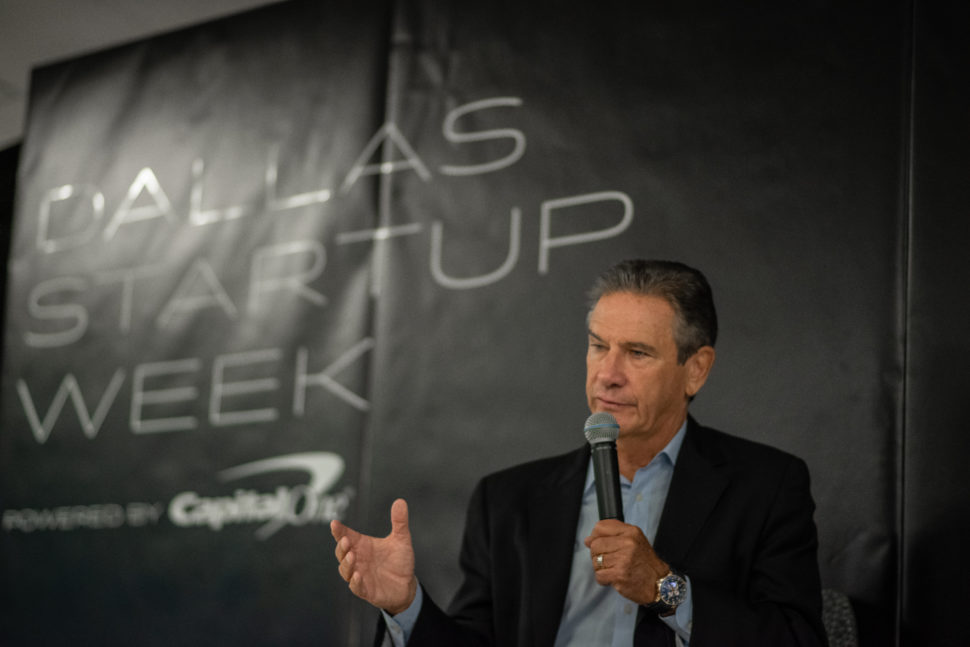Craig Hall has around fifty years of experience as an entrepreneur. So yes, one might refer to him as a bit of an expert.
From software to real estate to winemaking, Hall has garnered expertise in a myriad of industries. He began in real estate, started a chain of sports clubs, has been in the health maintenance business, and dabbled in oil and gas. At one point in time he oversaw 5,000 employees. And he’s overcome various obstacles and challenges along the way.
So, during Dallas Startup Week, Hall sat down with Alyce Alston, CEO of The DEC Network, to discuss the issues facing entrepreneurs today and how our country can level the playing field to safeguard the American Dream.
Hall first became intrigued on this topic back in 2011, when he realized startups in the U.S. have been declining for around three decades, and about half of the companies are started today as they were in the late 1970s. He began researching; trying to understand these statistics and figure out what could be done to preserve the situation. He looked back at his career, and what’s changed.
Then he compiled all of his findings into his seventh book.
Set to be released this May, “Boom: Bridging the Opportunity Gap to Reignite Startups” is going to expose the reasons behind this downward spiral and explore the various strategies that could help solve the problem.
During the DSW19 chat, Hall described his perspective as that of an entrepreneur, and not a professional writer or professor. “I think there are many, many things that have caused entrepreneurship and startups to go down, but in the United States today, we’re probably—if not the premiere—one of the best countries in the world for big startups, billion dollar unicorn startups,” he says.
But, according to the World Bank, the U.S. is only 49th in terms of ease of starting a new business.
That’s ironic, Hall explains, because the nonprofit and local community support wasn’t nearly as exciting or available decades ago as it is today. On the one hand is startup popularity and 6 million people watching shows like Shark Tank, but on the other, the numbers don’t belie the success.
“That’s wrong,” Hall says. “I mean, that, to me, threatens the whole American Dream and the American spirit and what built this country. And that’s what compelled me to write about it. I believe that they’re solvable problems.”
What Hall refers to as “unicorn startups” are those that receive huge, vast amounts of funds to put into home run ideas. There’s a lot of money in the U.S. for that—but what about somebody who wants to just do a single or a double, so to speak?
“We as a country should kind of have a dialogue,” Hall says. “We should look at this and we should say: Is this the country we want? Or do we want to do something about it? Are there things that we could do? I think that the fact that DEC exists, and what you all are doing, is fabulous. There’s so many good things that are going on.”
But, a major issue Hall points to is the gap in access for startup founders, specifically women and people of color. He calls it a huge priority.
“We need to kind of scream about that,” Hall says. “There’s a lot of talent that is not being allowed to maximize itself. And if we had more success in helping women entrepreneurs and people color, we would dramatically improve our country… We don’t care enough about it.”
Hall says there’s not currently a seat at the table for the wannabe entrepreneur, but there needs to be, as he wants people to realize the importance of entrepreneurship. He thinks the shift should be to becoming ‘we entrepreneurs’: people who care about startups, helping each other and creating a virtuous cycle.
And this is the place to do it.
“I think the basis is here, we just got to keep nurturing it,” Hall says. First, we have to make sure that both the elected officials and the policies are apart of that.
“Clearly, Texas, is a can-do state,” he says. “And Dallas is a can-do city.”
Advice from a serial entrepreneur
When it comes to starting and growing a business, Hall says it’s all about survival until you thrive. He’s had his good moments, but he’s also had some really bad. The good times will happen if you hang in there long enough.
“Entrepreneurship is not the glamour that you see in these movies,” he says. “It’s hard work, and it’s stick-to-it-iveness. It’s being willing to, at times, have your head handed to you with lots of big mistakes; everybody makes mistakes. I’ve been through some horribly tough times. But that’s part of it. At the same time, it’s just super rewarding and the best. I feel like I’m one of the luckiest people I could imagine.”
For entrepreneurs currently undergoing any similar “tough times,” Hall recommends reassessing where the passion lies. Although cash flow is a critical part of starting a business, the focus should be more on getting back to that core company mission statement.
“It’s hard to explain to anyone how you get up every day with the mission of doing the best you can to solve the problems,” he says.”It’s not about making money. It’s about, you know, stemming losses. If you do that, eventually it gets better.”
On being a leader
What a lot of people don’t know is that Hall dropped out of the University of Michigan, and he personally considers it to be of huge value—it’s made him who he is today.
“What’s missing today in our world and too many places, is just genuine authenticity, just being yourself,” he says. “People respond to people who are real.”
Hall says his leadership style has adapted over time depending on his role. In his earliest days, he didn’t have time to even think about being a leader.
It’s just been about being an authentic human being.
“Leadership is about just being part of a team,” he says, “but it’s also about being a listener. It’s about ultimately not being afraid to be an authority and a decision maker. … If you overthink it, and if you spend too much time thinking about your leadership style, there’s probably something wrong with it. If you’re just being yourself, and you really have somewhere you want to take your company, that should work. I think that’s missing in a lot of people today…. Just be yourself; comfortable in your own skin.”
![]()
Get on the list.
Dallas Innovates, every day.
Sign up to keep your eye on what’s new and next in Dallas-Fort Worth, every day.


































































